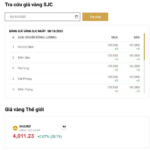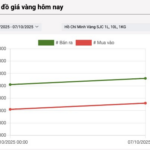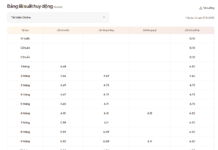Starting today (October 10th), Decree 232/2025/NĐ-CP officially takes effect, marking a significant milestone in the management of gold trading by eliminating the state’s monopoly on gold bars.
Notably, under Decree 132, gold transactions valued at 20 million VND or more per day must be conducted through the customer’s payment account and the gold trading company’s account at a commercial bank or foreign branch.
Additionally, gold bar traders are required to publicly disclose buying and selling prices, store customer information (including citizen ID and tax code), transaction values, and connect and provide information to the State Bank of Vietnam (SBV).

Domestic gold prices dropped sharply this morning. Illustrative image
Regarding gold prices, domestic prices plummeted this morning as global prices fell below $4,000/ounce. Domestic gold bar prices are currently listed by companies at 139.9 – 141.9 million VND/tael (buy – sell), a decrease of 600,000 VND in both directions compared to the previous session’s close.
Similarly, gold ring prices at companies have also dropped significantly compared to yesterday’s close, currently fluctuating around 140 million VND/tael. This marks the first price decline for domestic gold after several days of increases.
With the current gold ring price nearing 140 million VND/tael, buyers or sellers of more than 1 tael of gold must make payments via bank transfer.
These new regulations aim to enhance transparency, traceability, and transaction origin verification, while ensuring customer information authentication without introducing new administrative procedures. Moreover, payment via bank accounts enables authorities to easily track cash flows, reducing the risk of fraud, money laundering, and tax evasion in the gold trading sector.
Recently, several gold trading companies, including Bao Tin Minh Chau LLC and Saigon Jewelry Company (SJC), have notified customers about the new regulations taking effect from October 10th.
Multiple enterprises and commercial banks will be permitted to produce gold bars

Illustrative image
According to Decree 132, eligible enterprises and commercial banks will now be licensed to produce gold bars, expanding import and export rights. This change not only creates new opportunities for the gold market but also fosters competition, benefiting consumers.
The SBV will consider granting gold bar production licenses to enterprises meeting specific criteria, such as holding a license for buying and selling gold bars, having a minimum charter capital of 1,000 billion VND, and not having been penalized for administrative violations in gold trading or, if penalized, having completed all remedial measures.
For commercial banks, the standards are higher, requiring a minimum charter capital of 50,000 billion VND, a license for buying and selling gold bars, and full compliance with SBV’s operational safety regulations.
In Vietnam, approximately 8 banks meet the charter capital requirements for gold bar production, including Agribank, BIDV, MB, Techcombank, VPBank, Vietcombank, and VietinBank. Additionally, 3 companies—PNJ, DOJI, and SJC—also meet the charter capital criteria.
In the international market, gold prices fell below $4,000/ounce this morning. Experts attribute the decline to strong profit-taking pressure from investors, particularly following news that Israel and Hamas have agreed to release all hostages held by Hamas in Gaza. The easing of geopolitical tensions has diminished gold’s appeal as a safe-haven asset.
Currently, the global gold price converted at the listed exchange rate is approximately 127 million VND/tael.
Peer-to-Peer Lending in Vietnam: A Legal Turning Point Reshaping the Market
The new legal framework for peer-to-peer lending (P2P Lending) in Vietnam is reshaping the industry landscape, presenting both opportunities and challenges for businesses within the sector. These regulations establish a clear legal corridor, significantly influencing operational strategies, risk management, and the overall growth potential of the market.




















